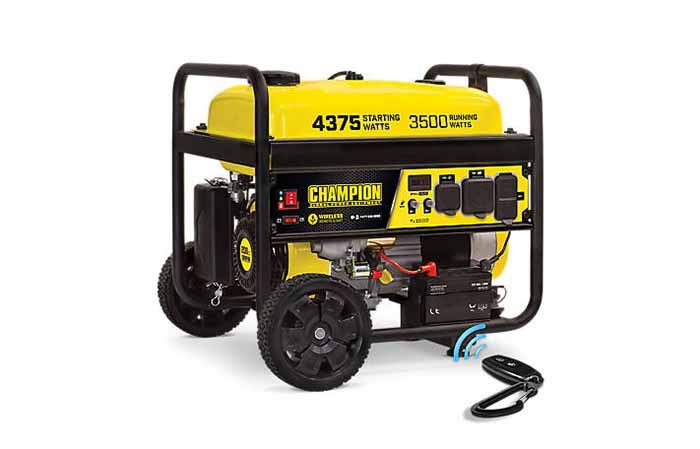Generators, like all machines, aren’t meant to run forever. The general wisdom is to run them for a given period of time then give them a break until you need to use them again. This doesn’t mean that the generator can’t run for long since it definitely can do that.
While the most common generators can run for about 7 hours, there are some that can run for days on end and even weeks. However, the question to the runtime of a generator is subjective since each generator is meant to serve different purposes for different periods of time.
The general advice here is that you need to always give your generator a break even when it has a long runtime. Unless you need power for a critical piece of equipment that can’t be turned off for a few minutes, always shut off the generator, let it cool before running it again.
Generator Runtime
The runtime of your generator is determined by the number of hours stated by the manufacturer. In fact, each generator has its own runtime even when it has similar specifications to another one. Exceeding these hours is harmful to the generator.
Like all engines, generators are meant to be run for a given period of time then shut off. Most generators will have a runtime equivalent to a full tank of whatever fuel they use. When the tank runs empty, the generator should be shut off and given a break.

There are some large and expensive generators which can run for days on end. While this is indeed a major advantage, they still need breaks after a long period of running. The runtime can be kept only when the generator is in good condition. That means giving it breaks and constant repairs will give you the needed runtime.
Factors that will determine how long it will run
To know how long your generator can be run, there are some factors you need to consider such as the following:
1. Durability
The typical runtime of a generator is indicated by the manufacturer and differs from brand to brand. The reason behind this is that each generator has its own level of durability which dictates its runtime.
Most generators have a lifetime runtime of between 3000 and 5000 hours. This doesn’t mean that they should be run for 3000 hours at once. Rather, it’s a period of time in which they are run with breaks to reach a cumulative runtime of 3000 or 5000 hours. This also factors in issues such as proper maintenance and loading.
When used to supply power on a constant basis, generators quickly use up their lifetime runtime hours leading to early breakdowns and other issues. You can look at it as the mileage of a car in which the more you use it, the faster it gains mileage and the faster it starts breaking down.
2. Portability and size
The general rule of thumb is that large generators supply more power and will likely have a longer runtime than smaller ones. The generator you need for your RV, for example, will have a shorter runtime than the generator you need to run your home appliances.
The size of the generator also determines the size of the tank it comes with. All generators are able to run the engine until the tank is empty no matter how large the tank is. This holds true for all types of fuel the generator comes with (even the multi-fuel kind).
Standby generators, which are the largest of the lot, are more likely to have larger independent tanks which enable them to run for several days on end without a break. With these ones, you can even run them for 500 hours at a time.
3. Type of fuel used
The main types of fuel used are diesel, gasoline, propane and natural gas. In terms of heaviness, the list is diesel, gasoline, propane and natural gas with diesel being the heaviest while natural gas the lightest. In our experience with most generators, heavier fuels allow for longer runtimes. For this reason, diesel generators will run longer on average than generators relying on natural gas or gasoline.
The use of heavier fuels is also dependent on size with most diesel generators generally bigger and more powerful than gasoline ones for example.
Another aspect to consider is that generators running on lighter fuels generally require more maintenance than heavier ones. Lighter fuels require less robust parts hence they will need more frequent breaks compared to the heavier engines running heavier fuels.
Another reason why generators on lighter fuels have a shorter runtime is that of safety. However tempting it may seem, never refuel a running generator with the lighter fuels such as gasoline and propane since it’s very risky. You’ll need to shut it off, wait till the engine is cool before refueling. You can, however, refuel a diesel generator as it still runs.
With propane, you can use more than one tank to run the generator then control the two (or more) tanks with a changeover regulator or stopcock valve. This way, the propane generator can run for as much as 200 hours on end. We do not, however, advocate for that as it may damage your generator.
4. Engine oil levels
Engine oil acts as both a lubricant and coolant. Its levels in the engine are among the most important considerations to make. Before starting the generator, always check for the engine oil levels to make sure it’s well-lubricated.
When the engine oil level goes down below a certain level, most modern generators have a switch to shut it down. This prevents damage to the engine and will also dictate the runtime of your generator.
5. The load on the generator
The load of a generator refers to the amount of power being drawn from it. It is usually rated in fractions or percentages indicating how much of the generator’s total power output is being used up. For example, ½ capacity means that only 50% of the generator’s potential is being used.
On the same tank of fuel, the load level determines how much fuel will be used and, in turn, the runtime. Running a generator at half capacity will approximately give you double the runtime you would have gotten running it at full capacity.
These factors help you determine the average runtime of the generators you own or plan on owning. Besides that, they also help you estimate the cost of running a generator for a given period of time.
How to keep a generator running for long
To keep your generator in the right condition to run for a long time both between intervals and the total lifetime, follow the tips below:
- For propane and diesel generators, having a larger independent tank connected to the generator will increase its runtime. This isn’t safe for gasoline generators as having large amounts of fuel around it is a danger.
- If the generator is a new one, change the engine oil after every 100 hours of use. If it’s an old one, change it after every 24 hours of heavy use. This keeps the engine in good condition.
- Always keep the generator clean. This will require periodic washing, dusting and general cleaning as dirt easily clogs up vents and ducts besides damaging some delicate parts.
- Make routine inspections of the generator at least once a year where you check all the parts to ensure they’re in good condition. As the generator grows old, the frequency of the inspections should increase.
- Store the generator properly. Make sure it’s not exposed to the elements such as rain and direct sunlight by providing a well-aerated shed. To prevent corrosion within the cylinder bore, always remove all the fuel and the carburetor float chamber after charging it before you store it. Remove the spark plug then set the recoil starter knob in the neutral position.
- Run it at least once every month when in storage to keep it fresh and in good condition. This also helps use up the fuel to prevent it from going stale and unusable.
- Always take a look at the air filters and change them at least every 100 hours of runtime or once a month depending on which comes first.
- Avoid using old and stale fuel with the generator. In most cases, fuel shouldn’t stay in the generator or in a can for more than a month without being used up. If this is the case, replace it with fresh fuel.
- Check for leaks and seal them up if you come across any of them. Seals not only reduce the efficiency of the generator; they also pose a hazard as leaking fuel can easily lead to a fire.
These and many other tips will keep your generator in good condition and running for much longer. If you want a longer runtime for your generator, follow them strictly.
If your current generator has a short runtime and you need more power, consider getting another generator that has modular compatibility. This will allow you get more power during peak times with one or more generators shutting themselves off when the power needs go down.
